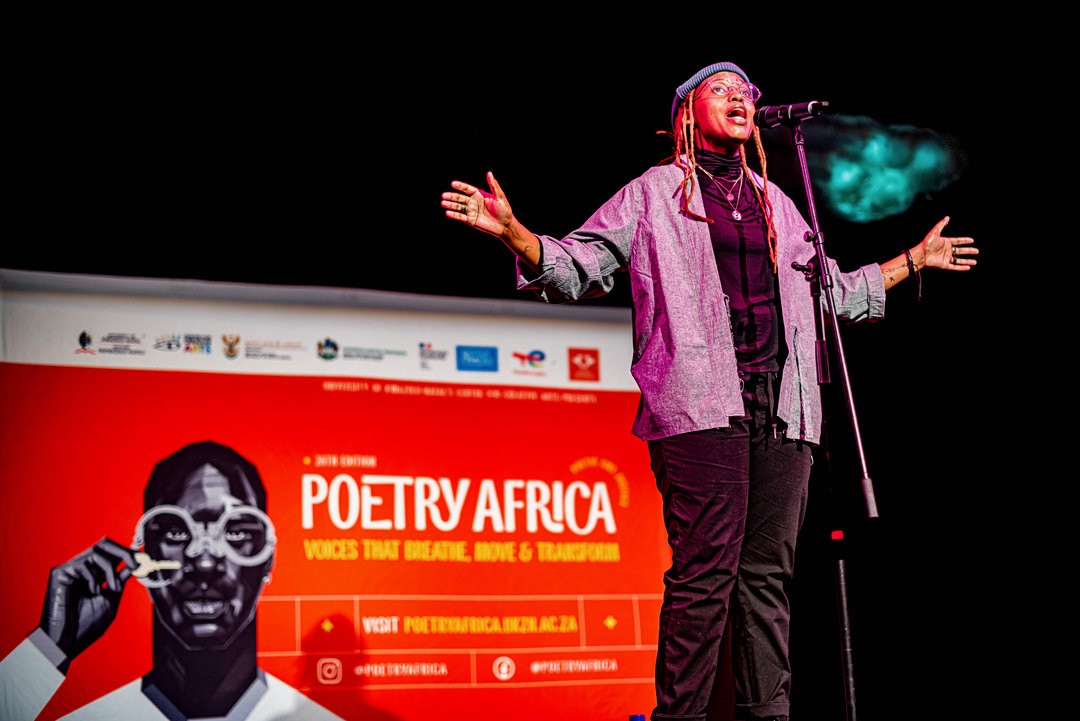“Right To Speak” leverages the power of digital to create spaces enabling young poets across oceans to speak, learn and grow together while supporting and building capacity for local organisations for sustained impact.
Although spoken word artists in South Africa have opportunities to showcase their work locally and regionally, there are major gaps that support engagement with international audience. This lack of internationalisation has worsened due to the Covid-19 pandemic. The pandemic revealed a real need for artists and organisations to better understand digital developments and how to adequately translate their work.
The project Right to Speak intentionally and strategically addressed these needs. It leveraged the power of digital to create spaces enabling young poets across oceans to speak, learn and grow together while supporting and building capacity for local organisations for sustained impact.
The project opened up avenues for poets & organisations to find and create decent work and economic growth. Their focus on building strong relationships is aimed at sustaining connected, safe and inclusive physical and digital communities. Lastly, gender equality was a key topic and the project ensured fair representation of women and women-led organisations.
Preparing emerging poets for the international stage
For the project’s design, the project team conducted an exploratory survey to better understand the target community’s needs. It found that the most common needs included:
- Arts administration training
- Capacity building for organisations
- Access to international markets
- Spaces and opportunities for collaboration
The project intentionally and strategically addresses these needs. The Covid-19 pandemic revealed a real need for artists & organisations to better understand digital & how to adequately translate their work. In response, the project team has ensured digital skills workshops using digital tools & platforms to showcase digital performances and discussions. The project opens up avenues for poets & organisations to find/create decent work & economic growth. Their focus on building strong relationships is aimed sustaining connected, safe, & inclusive physical & digital communities. Lastly, gender equality is important. The project ensured the fair representation of women & women-led organisations.
The project launched the South African Poets Catalogue aimed at promoting a specially curated list of young and thriving South African Poets to inter- national markets including Europe. The Catalogue profiles 20 prolific young page and stage poets from the length and breadth of South Africa. Highlighting emerging poets who are ready for international stages, the catalogue is aimed at small and large poetry and literature platforms around the world and provides an easy guide for programmers and promoters interested in booking and showcasing South African spoken word talent. Find the catalogue here!
Right to Speak Workshop series
The Right to Speak Virtual Workshop series had close to 60 participants logging in to a 90-min Masterclass every night, for six nights in a row, sharpening their skills and deepening their understanding of the business of art. From financial literacy, branding and proposal writing to funding, arts administration and tools for multimedia production, the sessions were lively and engaging and led mainly by poets – really making it clear just how much work goes on behind the scenes for any poet to build a sustainable career.
Digital Actions
Through the project's social media channels, several initiatives have been rolled out. Supported by the EU Delegation in South Africa, the #6WordStory campaign explored human rights issues through 6-word-long poems. Every last Thursday of the month, Right to Speak hosted an Open Mic space on Twitter, welcoming poets and human rights activists from around the world to share their poems and experiences.
In order to help realise the South African poetry landscape’s aspirations and desires, it helps that some of the biggest role players within the industry have an opportunity to act in one accord. The impact that can be attained when working together far supersedes the impact that’s achieved when working independently.
Phomolo Sekamotho, Hear My Voice
Right to Speak has been collaboratively designed by the partners with the vision of creating an opportunity for poets and poetry organizations from South Africa and Europe to share experiences, support mutual learning and to build strong relationships. We seek to create performance opportunities and strengthen capacities in the sector. Our common vision is a creative exchange that inspires future collaborations.
Asma Diakité, Head of Cultural Programs at the Goethe-Institut

